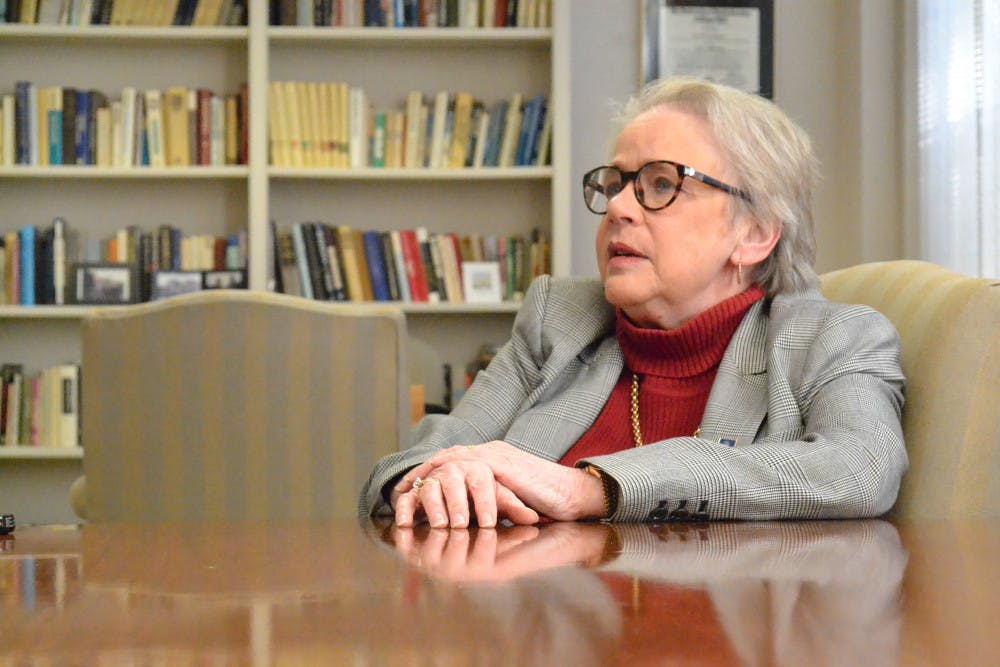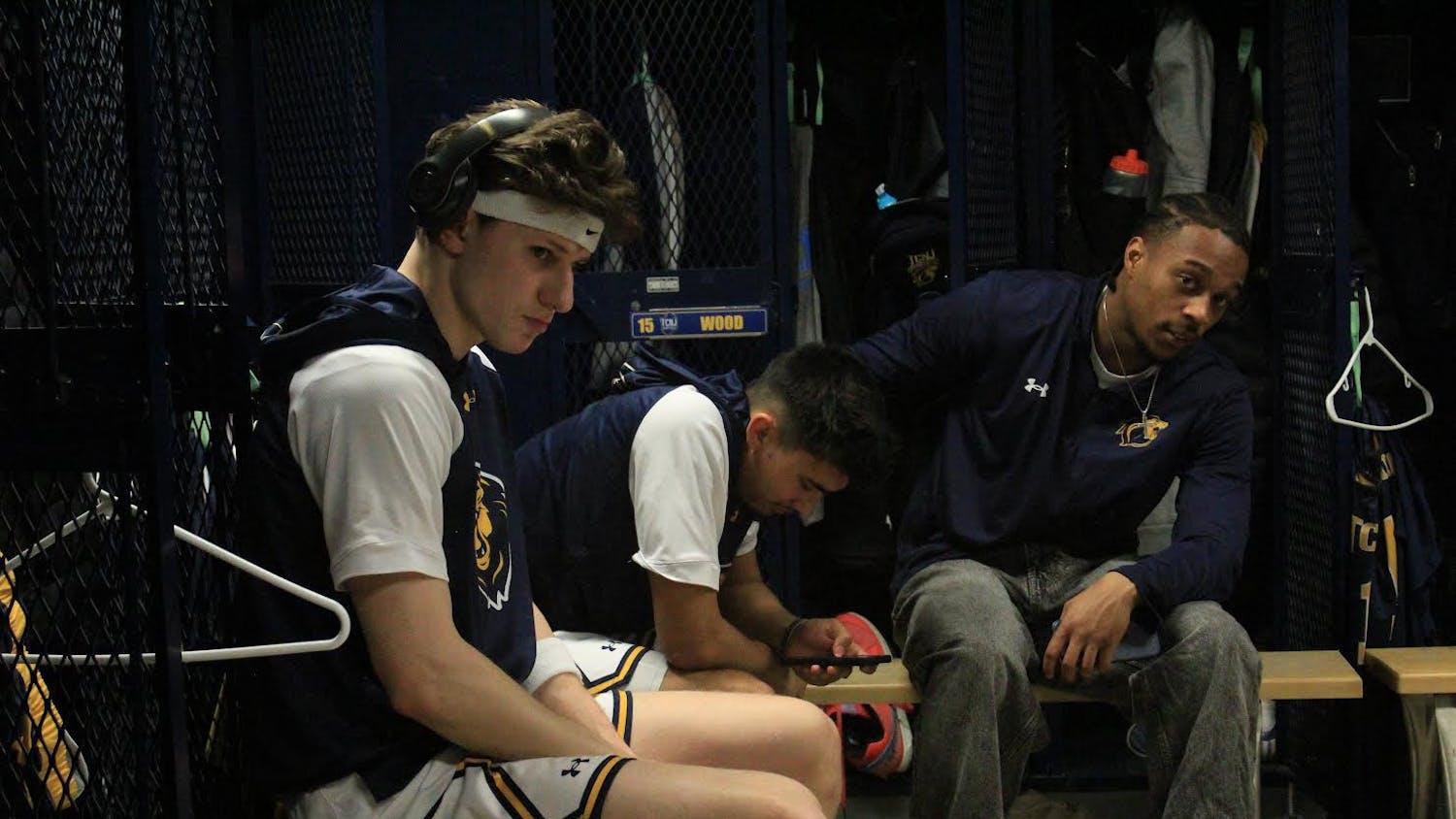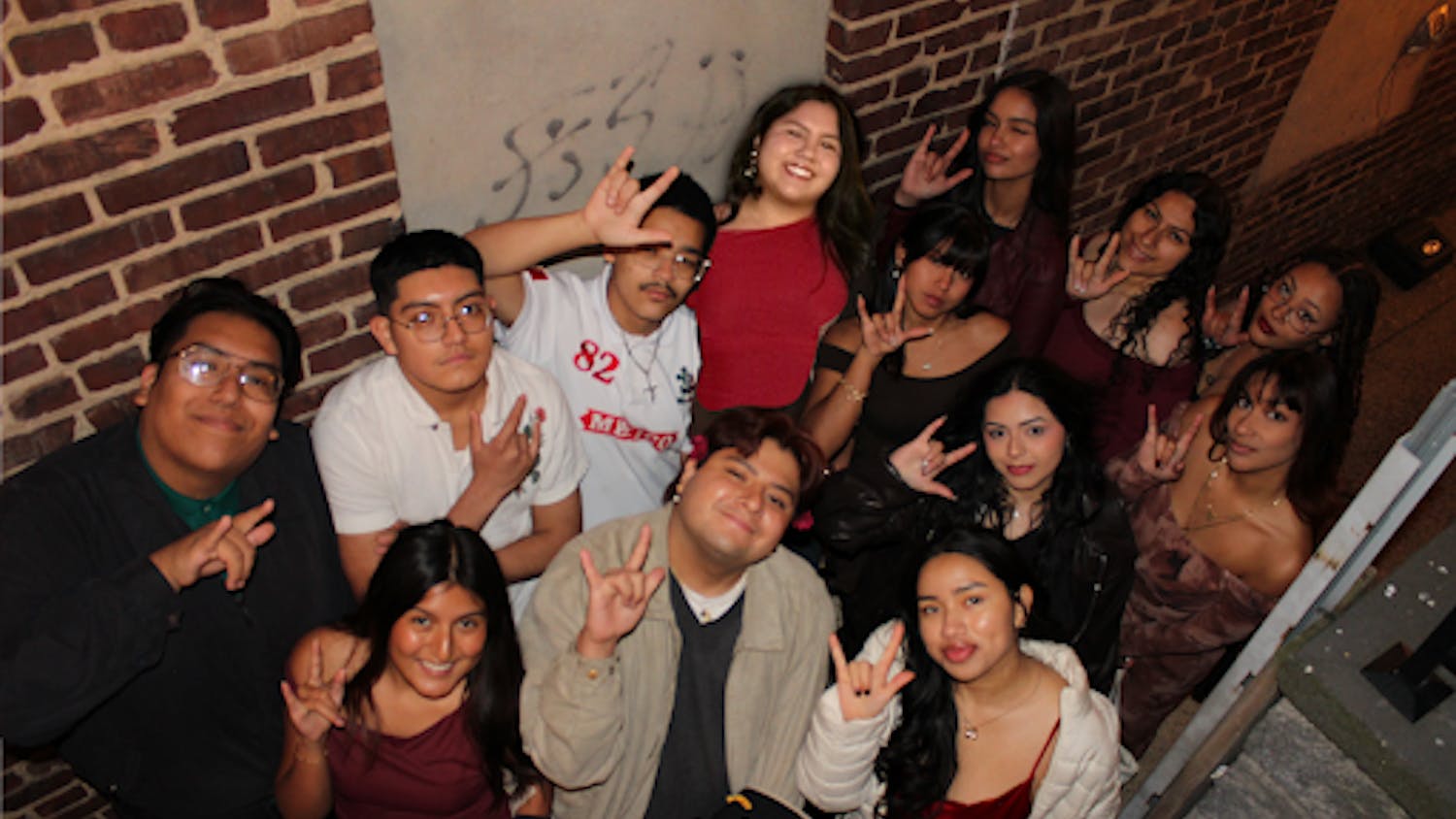By Connor Smith
Editor-in-Chief
R. Barbara Gitenstein was a seemingly unremarkable music major at Duke University in the late 1960s. She loved to sing, and had a nice voice, but not a great voice, in her own words.
Like many students at the College, Gitenstein couldn't decide on a major. She began studying biology but didn't feel a deep connection to the subject.
"I must admit that the vast majority of intellectual, curious students change their majors, and an institution should make it such that you could graduate in four years," Gitenstein told The Signal. "I think we do that as well as we can."
Since she had a strong passion for classical music and opera, Gitenstein became a music major and dedicated her time to singing. Although the drive was there, the talent simply wasn't.
"I just wasn't that good a singer, and that was a very hard thing to accept," Gitenstein said. Her singing career died before it began, but this failure led to her lifelong passion and eventually a near 20-year tenure as one of the College's most accomplished presidents.
Under Gitenstein, the College has seen many successes, such as its four-year graduation rate, which increased from 58 percent in 1999 to 76 percent in 2016, favorable rankings, which includes the No. 24 spot in MONEY Magazine's national “Best Colleges for Your Money” list, and increased enrollment in spite of downward regional trends.
Gitenstein led the College through a complete academic transformation and pioneered sexual assault prevention and awareness initiatives years before these practices became a national trend. She’s helped shatter fundraising goals and oversaw several construction projects on campus.
Despite all of this, Gitenstein is more than happy to talk about her many failures and disappointments.
"I think we suffer from our success, just like the students suffer from their success," Gitenstein said. "The students we attract at TCNJ are highly accomplished, so they got here by a lot of accomplishments. They are not accustomed to facing disappointments or failures. Sometimes, I think that causes them more angst. I think it's up to us as educators and as support services and as friends to help one another understand that failure is part of life. Disappointment is part of life. It's not about how it happens to you, it's about how you use it going forward. I don't think TCNJ is highly distinctive in that regard, except for the fact that we have very talented students."
When Gitenstein swapped her major from music to English, she put this philosophy into practice.
"In regard to music, that was a real disappointment to me," she said. "I'm serious, that was a real loss for me. But then I came to understand over time that there was so much that I had learned from that experience that helped make me be a really good president and a really good communicator."
While she didn't know it at the time, her musical training played an instrumental role in her success as president.
"I maintain that being a president has a lot to do with performance, so that's really how I integrate that passion for performance," she said. "In fact, people who know my voice will tell you that I sound different when I’m giving a speech than when I’m talking, because I’m using all those things that I learn as a singer. I don't do it consciously."
Gitenstein grew up in Florala, Alabama, the daughter of a New York City transplant, Seymour Gitenstein. Seymour Gitenstein was a classical pianist who left the city when his father's business went bankrupt. At 17 years old, he left for Alabama alone to scout out land for a shirt factory.
"That's courage," President Gitenstein said. "Then, he's scouting out places for a factory. He had this little room that he rented with a piano! … But at any rate, he was all by himself. And then he really committed to that community and he was there from when he was 17 to when he died at age 95."
Gitenstein learned a lot about leadership from both her father and from her experiences attending an all-female boarding school near Washington D.C.
"Everything that I know about business I learned from Dad, but I had no idea that I’d learned anything about business from him until I became a president," she said. "I knew I learned a lot from him about other things, personal development and values and whatnot. At one point, he had an employee base of about 800, I think was the top number. He was the largest employer in that county and he knew how to have a personal relationship with individuals. It wasn’t like, ‘I'm gonna go out and speak to three people today and put it on my checklist.’
"He actually liked people, and they knew that he liked them, and he could communicate to them that he really cared about what was happening in their families. That makes a difference. I think people felt that."
At boarding school, Gitenstein was prepared for leadership roles at a time when the country lacked female administrators.
"There were a lot of expectations about how women were supposed to engage, and so when I decided to go to graduate school, and also even before, as I look back, I realize I developed a lot of really wonderful mentors and all of them were men, except for the women back in the high school, and my grandmother," she said. "I had to learn that that was okay, because there weren't mentors out there"
One of Gitenstein’s vivid memories from graduate school was meeting with her adviser, a southern gentleman, while she was dressed like "a typical graduate student" on the University of North Carolina at Chapel Hill campus.
"He tipped his hat, because he saw a lady," Gitenstein said. "I was in flip flops and jeans and it was just sort of one of those wonderful moments of, ‘Oh my god, we're very different.'"
This difference in perspective can be positive for growth, according to Gitenstein, though she is "thrilled to see the kind of change and leadership now so that there are more women and there are more individuals from underrepresented groups in leadership roles."
The College was far from Gitenstein's first application for an administrative position. Her name was out in a lot of searches, and she got turned down a number of times throughout the years.
Gitenstein tried to understand why she'd been continually passed over. Eventually, a search consultant told her the truth: She wasn't listening to questions.
"I had in my head things I wanted to say, and I just talked," Gitenstein said. "It was a really good lesson to learn, whether you're talking about doing an interview or whether you're talking about just being in life."
Constantly learning and growing, Gitenstein went from assistant provost at the State University of New York-Oswego to provost at Drake University. The then provost at SUNY-Oswego, Don Mathew, was sure Gitenstein had something special.
"Don Mathew is the first person who ever said to me, ‘You're gonna be a president,’ and I said, ‘Are you out of your mind?' I mean, I thought he was nuts."
While at Drake, the former president of SUNY-Oswego referred Gitenstein to the College's presidential search committee, and she fell in love with her future home.
"When I first came to the College, it was clear to me that the College was an extraordinary place," Gitenstein said. "I mean, I really wanted this job badly, and I was thrilled when it was offered to me. But there was work to do."
At the time, Gitenstein felt the academic standards were not up to par with her perception of the students and faculty, but it took time to devise a plan.
"When you first come in, it's like drinking water out of a fire hydrant, I have to tell you," she said. "First of all, you have no idea where the next thing is coming from. I listened to a lot of people and I had some ideas before. I'm not sure that a person coming in should have a plan in place. I did not."
The College's academic transformation plan was devised by former provost Stephen Briggs, but Gitenstein helped get students and faculty on board with longer, more academically intensive classes and an emphasis on liberal learning coursework by incorporating them in the shared governance process.
"The way you can tell it's successful is what has happened to the students and the remarkable transformations in the kind of outcomes we're seeing," Gitenstein said. "We’re seeing more and more students go to graduate school. We’re seeing more and more students do extremely well in their first jobs and move up in the leadership. … They've accomplished so much in such a short amount of time. Now, I know they’re smart, but I have to believe that something that has happened here has helped them as leaders and as thinkers."
Gitenstein has faced many challenges during her tenure at the College. Her first year, the College was under investigation for potentially underreporting sexual assaults. While the issue was resolved as a bookkeeping error, Gitenstein was not satisfied with the reported numbers of one sexual assault in a year.
"We've just got too many people here, that's just not possible," she said. "I'm not wanting it to be higher, but I know it's higher. So what is it that is happening on the campus that is preventing students — usually students, they're not all students but the vast majority are students — from coming forward and saying, ‘This is what happened to me and I want to hold the perpetrator accountable and/or I need some help'?"
Gitenstein helped establish a sexual assault task force and the Office of Anti-Violence Initiatives in 2004.
"And then you look at when it really started hitting the news, about four years ago or five years ago, we thought, 'OK, we've already done most of these things that other colleges are doing now.' But I still am disappointed at the numbers of students who feel comfortable coming forward," she said.
Gitenstein’s biggest challenge came in 2006 when then Gov. Jon Corzine proposed a $12.1 million cut to the College’s funding.
“I don't think there’s been (a cut) that has compared to that since then, percentage-wise,” Gitenstein said. “I was just devastated. How was I possibly going to run the enterprise?”
Although the cuts were monumental, within the next week, the disappearance and death of College freshman John Fiocco Jr. put things in perspective for Gitenstein.
“I just realized that (the budget) was something that could be handled, that you just basically decide on priorities,” Gitenstein said. “This is how much money you have, this is all the money you're going to have, so if that's all the money you're going to have, what can you do and what can’t you do? And just quit worrying about it.”
Meanwhile, the Fiocco disappearance devastated the campus.
“Students were terrified, parents were terrified, faculty were terrified,” Gitenstein said. “We didn’t know what was happening. I learned how important it was to communicate and communicate honestly, to make sure that if you had information, you shared it, and that people trusted that if you were not telling them something, you either didn’t know it or there was a legal reason why you weren't saying it. It wasn’t that you were just trying to protect the image.”
Gitenstein, who never brought on an outside public relations firm, worked closely with the then head media relations officer, Matt Golden, to craft messages and communicate with the campus community.
“People heard from me,” she said. “I think that was a really good lesson. It stood me in good stead, as you look at other kinds of difficult times that we dealt with, like last year when we were talking about the Loser/Trenton Hall issue, or whether we were talking about the clinic. Just be forthright and tell people the information that you have, let people know as much as you can about the next steps you’re gonna take.”
Through hard times and harder lessons, Gitenstein continues to lead by example in her final year. When she retires this June, she’ll finally join her husband, Donald B. Hart, in their life after the College.
“He's been retired for a while, so he's been sort of anxious for this over the past couple of years,” Gitenstein said. “He's ready. His main line is — we like to travel a lot, and we've been traveling in the summertime because that's basically the only time I can travel, and he hates the summer. Just hates the heat, so he says, ‘Thank goodness, now we can go in the fall! We don't have to worry about leaving the College!’”
As for her legacy, Gitenstein, as always, focused less on herself and more on the community of students, faculty and alumni that surrounds her.
“I hope that the legacy is about this sense of community and this sense of shared purpose, which is a commitment to excellence but a commitment to making a difference in the world,” she said. “That an individual can make a difference in the world. We could only do that if we do it together, and if we're dismissive or condescending to one another, it's just not going to work.
“I think I've said this to you before, but I worry very much about the rhetoric about conversation in the public right now, whether you're talking politically or just generally. How people talk to one another. I think people minimize that, but if someone is dismissive of you, either by name-calling or by acting as if they're better than you for whatever reason, how are you possibly going to partner with them? Why would you partner with them? Why would you even talk to them? I worry about that.”
Gitenstein is thankful for Hart, as well as her children, Pauline and Samuel, who all supported her through years of the administrative grind.
“If you want to do something like this, choose your partner first and then worry about everything else,” Gitenstein said. “There is no way I could have done this without Dr. Hart, Don, no way. He's been there 125 percent of the time, you know. And then I have great children. But they just put up with the stress of the situation. He's in academics, so he's a great adviser too.”
In seven months, Gitenstein’s nearly 20-year presidency will give way to life in the city, where she can finally go to daytime operas and work on some writing.







